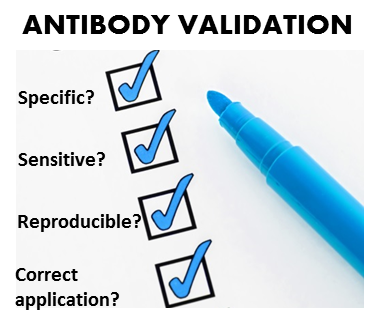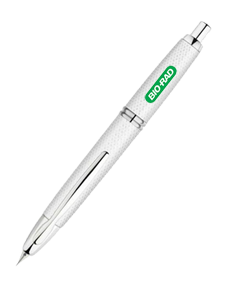
Popular topics

-
References
Antibody Validation Roundtable specificity + sensitivity + reproducibility=validation Webinar. Science Magazine. 3 Dec 2014. Accessed 7 Aug 2015.
Baker M (2015). Reproducibility crisis: Blame it on the antibodies. Nature 521, 274-276.
Begley CG and Ellis LM (2012). Drug development: Raise standards for preclinical cancer research. Nature 483, 531-533.
Bordeaux J et al. (2010). Antibody validation. Biotechniques 48, 197-209.
Bradbury A and Andreas P (2015). Reproducibility: Standardize antibodies used in research. Nature 518, 27-29.
Collins FS and Tabak LA (2014). Policy: NIH plans to enhance reproducibility. Nature 505, 612-613.
Freedman LP (2015). Antibodies: Validate recombinants too. Nature 518, 483.
Madhusoodanan J. Validating Antibodies: An Urgent Need. The Scientist Magazine. 1 Dec 2014. Accessed 7 Aug 2015.
Polakiewicz RD (2015). Antibodies: The solution is validation. Nature 518, 483.
Slaastad H et al. (2011). Multiplexed immuno-precipitation with 1725 commercially available antibodies to cellular proteins. Proteomics doi: 10.1002/pmic.201000744, Epub ahead of print.
Standardizing Antibody Validation

An internet search for antibody validation provides a long list of research articles, industry tips from various biotech companies and blog sites, as well as commentaries from major media outlets. The topic has recently generated a buzz in the scientific community due to studies showing that the findings of major research studies could not be reproduced, leading to lost time, money and delayed scientific discovery (Begley and Ellis 2012, Collins and Tabak 2014, Slaastad et al. 2011). This growing problem is being referred to as the reproducibility crisis and it has been suggested that poorly validated antibodies are responsible (Baker 2015). Unfortunately, there seems to be no consensus in the scientific community as to what antibody validation should entail.
An important problem to address
There’s no doubt that scientific advancement demands the availability of specific and reproducible antibodies and several scientists have championed various initiatives to address this important problem that challenges the credibility of science.
Perhaps the most thorough explanation of antibody validation has been described in an article aptly titled ‘Antibody Validation’ (Bordeaux et al. 2010). The article presents a detailed multistep process for effective antibody validation, which the authors suggest is a “compromise between rigor and lab economics.” They argue that a validated antibody must be proven to be sensitive, reproducible, and specific, in that it binds to what it is intended to bind to and works appropriately in its intended application. Most importantly, validation of an antibody requires careful experimental design and the use of positive and negative controls, such as cell lines or samples that do not express the target antigen, knockdown of the target antigen, or its overexpression. They further suggest that evaluation of antibody reproducibility should include testing the same antibody over time with different lots on different days. However, while this definition of antibody validation is practical, its widespread application or implementation of a standardized process is still a major area of concern.
Solving the problem has proven to be a community effort as demonstrated by the launch of the 1st International Antibody Validation forum held in October 2014. This meeting, included representatives from key fields such as academia, industry and scientific publishing, and served as a platform for discussing the issues related to the use of commercial antibodies in research. In addition, the lack of antibody validation standards was also discussed as an important factor in addressing the reproducibility crisis. It is expected that such a meeting of the minds will continue in subsequent years, as researchers and other stakeholders continue to work together for the greater good of science.
Addressing the reproducibility crisis
Other ideas to address the reproducibility crisis have emerged. One controversial proposal was a call for the public release of antibody sequences and the universal use of recombinant antibodies (Bradbury and Andreas 2015). Recombinant antibodies are developed in vitro using antibody genes and generally have limited batch-to-batch variability. This suggests that use of these antibodies could play an integral role in antibody standardization, and eventually eliminate “bad” antibodies that corrupt the scientific literature. Scientists and key stakeholders in response to this proposal have pointed out that in the end validation would still be required for recombinant antibodies and argue that ultimately antibody validation is the answer to the reproducibility crisis ( Freedman 2015, Polakiewicz 2015).
Although definitions of antibody validation have been proposed, there are still no clear and widely accepted minimum standards for validation. However, the reproducibility crisis suggests that implementation of validation guidelines is necessary and will benefit all parties involved, scientists and commercial antibody companies alike.
Highly validated antibodies for western blotting
Here at Bio-Rad, we stand behind the quality of every vial of antibody sold. In addition, we offer a series of highly validated PrecisionAb™ antibodies for western blot.
References
Antibody Validation Roundtable specificity + sensitivity + reproducibility=validation Webinar. Science Magazine. 3 Dec 2014. Accessed 7 Aug 2015.
Baker M (2015). Reproducibility crisis: Blame it on the antibodies. Nature 521, 274-276.
Begley CG and Ellis LM (2012). Drug development: Raise standards for preclinical cancer research. Nature 483, 531-533.
Bordeaux J et al. (2010). Antibody validation. Biotechniques 48, 197-209.
Bradbury A and Andreas P (2015). Reproducibility: Standardize antibodies used in research. Nature 518, 27-29.
Collins FS and Tabak LA (2014). Policy: NIH plans to enhance reproducibility. Nature 505, 612-613.
Freedman LP (2015). Antibodies: Validate recombinants too. Nature 518, 483.
Madhusoodanan J. Validating Antibodies: An Urgent Need. The Scientist Magazine. 1 Dec 2014. Accessed 7 Aug 2015.
Polakiewicz RD (2015). Antibodies: The solution is validation. Nature 518, 483.
Slaastad H et al. (2011). Multiplexed immuno-precipitation with 1725 commercially available antibodies to cellular proteins. Proteomics doi: 10.1002/pmic.201000744, Epub ahead of print.
You may also be interested in...

View more Applications or Feature blogs















